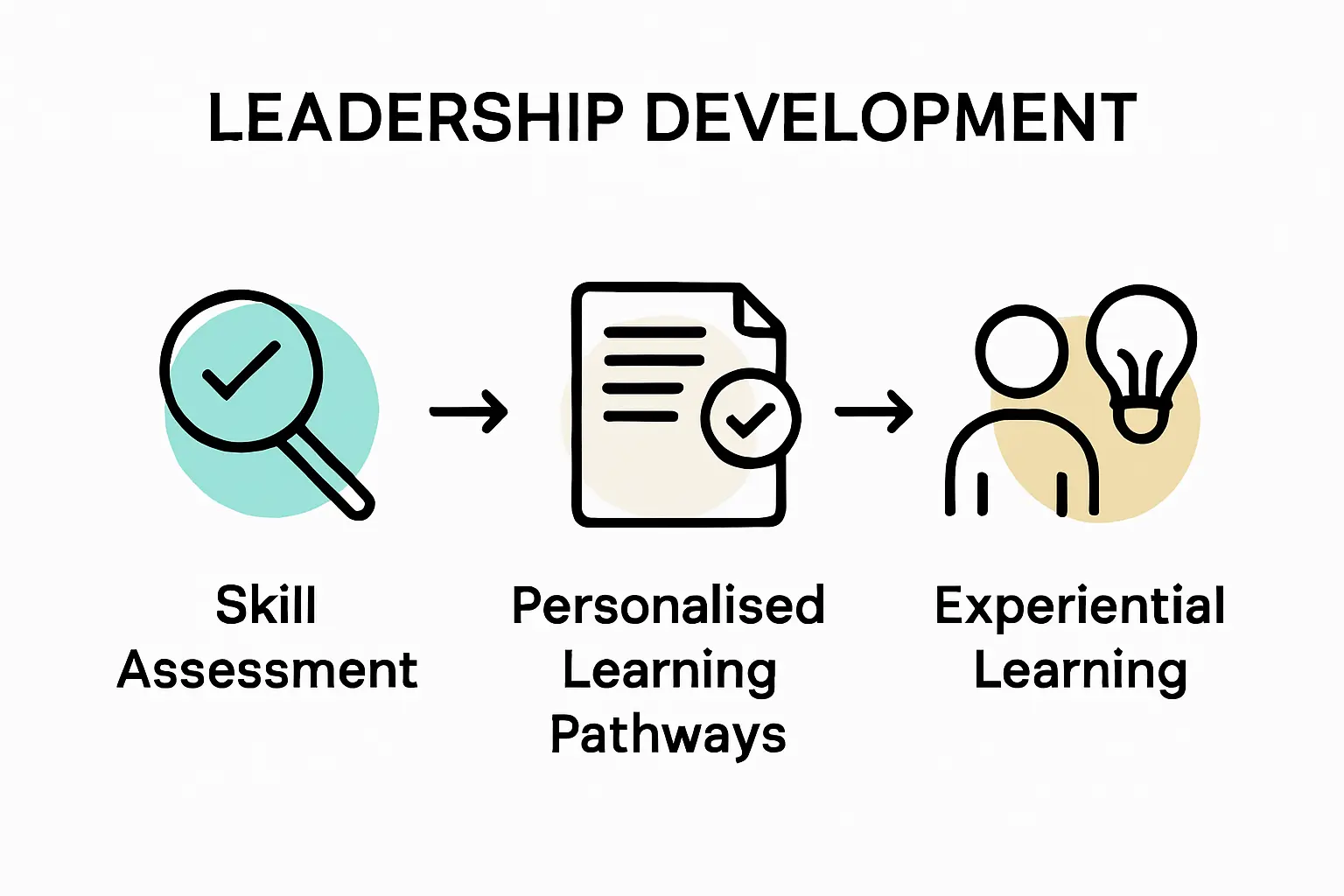Understanding Leadership Development Strategies

Leadership development strategies often sound like another corporate buzzword, yet every thriving company secretly relies on them. Some might think a quick training day is enough, but this is where it gets surprising. Organisations with structured leadership development programmes are 1.5 times more likely to outperform their competitors. Real results do not come from one-off workshops. They come from strategies that turn everyday managers into inspiring and adaptable leaders.
Table of Contents
- What Are Leadership Development Strategies?
- Why Are Leadership Development Strategies Important?
- How Leadership Development Strategies Foster Organisational Growth
- Key Concepts In Leadership Development Strategies
- Real-World Applications Of Leadership Development Strategies
Quick Summary
| Takeaway | Explanation |
|---|---|
| Invest in tailored leadership training | Personalised development pathways enhance leadership effectiveness and individual growth. |
| Integrate practical learning experiences | Action learning projects and mentorship programmes bridge theory and practice effectively. |
| Foster a continuous learning culture | Establishing frameworks for ongoing professional development strengthens organisational resilience. |
| Create a sustainable talent pipeline | Internal talent cultivation ensures strategic leadership continuity within the organisation. |
| Address contemporary workplace challenges | Effective leadership development helps leaders navigate technological and generational shifts successfully. |
What are Leadership Development Strategies?
Leadership development strategies represent systematic approaches designed to cultivate, enhance, and refine leadership capabilities within organisations. These comprehensive frameworks go beyond traditional training methodologies by creating holistic pathways for professional growth and organisational effectiveness.
To help clarify the essential components that make leadership development strategies effective, the table below summarises each core element and its main purpose within an organisational context.
| Core Component | Explanation |
|---|---|
| Skill Assessment | Identifies current leadership competencies and development needs |
| Personalised Learning Pathways | Tailors development programmes to individual leadership profiles |
| Experiential Learning | Provides practical opportunities for skill application |
| Formal Educational Programmes | Offers structured leadership theory and knowledge acquisition |
| Mentorship and Coaching | Facilitates knowledge transfer and practical guidance |
| Reflection and Self-Assessment | Enables leaders to evaluate and improve their own performance |
| On-the-Job Training | Builds capabilities through real workplace assignments |
Core Components of Leadership Development
Leadership development strategies encompass multiple interconnected elements that work together to build robust leadership capabilities. Our guide on staff training best practices provides additional insights into professional development approaches.
The core components typically include:

- Skill Assessment: Identifying current leadership competencies and potential development areas
- Personalised Learning Pathways: Tailoring development programmes to individual leadership profiles
- Experiential Learning: Providing practical opportunities for leadership skill application
Theoretical Foundations and Practical Applications
According to research from the National Institutes of Health, effective leadership development strategies integrate both theoretical knowledge and practical skill-building. These strategies often incorporate multiple learning modalities such as:
- Formal educational programmes
- Mentorship and coaching initiatives
- Structured reflection and self-assessment activities
- On-the-job training and challenging assignments
Successful leadership development recognises that leadership is not a fixed trait but a dynamic set of skills that can be systematically developed through targeted interventions. By creating environments that support continuous learning, organisations can nurture leaders who are adaptable, resilient, and capable of driving meaningful organisational transformation.
Why are Leadership Development Strategies Important?
Leadership development strategies are crucial for organisational success, serving as a fundamental mechanism for building resilient, adaptive, and high-performing teams. These strategic approaches address critical challenges in modern workplace environments by systematically preparing leaders to navigate complex business landscapes.
Organisational Performance and Competitive Advantage
Strategic leadership development directly impacts an organisation’s ability to achieve sustainable growth and maintain competitive edge. Our guide on public speaking for leaders explores how communication skills contribute to effective leadership.
The importance of leadership development is underscored by several key performance factors:
- Talent Retention: Investing in leadership growth demonstrates organisational commitment
- Innovation Acceleration: Developing adaptive leadership skills drives organisational creativity
- Cultural Transformation: Strong leadership development programmes shape positive workplace cultures
Addressing Contemporary Workplace Challenges
According to research exploring organisational transformation, effective leadership strategies are essential for managing complex workplace dynamics. Modern organisations require leaders who can:
- Navigate technological disruptions
- Manage multigenerational workforce expectations
- Create inclusive and supportive work environments
Leadership development is not merely a training programme but a strategic investment in human potential.
This table compares some of the main advantages of effective leadership development strategies for both organisations and individual leaders, highlighting the broad impact these initiatives can have.
| Beneficiary | Key Advantages |
|---|---|
| Organisation | Improved talent retention, accelerated innovation, positive work culture |
| Organisation | Enhanced strategic capabilities, preparation for market changes |
| Organisation | Sustainable growth and competitive advantage |
| Individual Leader | Access to personalised learning and growth opportunities |
| Individual Leader | Improved adaptability and resilience |
| Individual Leader | Enhanced skills for managing diverse and complex work environments |
How Leadership Development Strategies Foster Organisational Growth
Leadership development strategies play a transformative role in driving organisational growth by creating a robust ecosystem of skilled, adaptable, and visionary leaders. These strategies serve as critical mechanisms for building organisational capacity, resilience, and competitive advantage.
Talent Pipeline and Succession Planning
Effective leadership development creates a sustainable talent pipeline that ensures organisational continuity and strategic preparedness. Our guide on growing membership strategies illustrates how strategic talent development can positively impact overall organisational performance.
Key aspects of talent development include:
- Internal Talent Cultivation: Identifying and nurturing potential leaders from within the organisation
- Skills Transferability: Developing versatile leadership competencies across different organisational functions
- Continuous Learning Culture: Establishing frameworks that support ongoing professional development
Strategic Capabilities and Competitive Advantage
According to research exploring organisational development, leadership development programmes directly contribute to enhancing organisational effectiveness. These strategies enable organisations to:
- Build adaptive leadership capabilities
- Respond quickly to market changes
- Create innovative problem-solving approaches
By systematically investing in leadership potential, organisations transform individual skills into collective capabilities. This approach enables businesses to develop comprehensive strategies that anticipate challenges, leverage opportunities, and maintain a competitive edge in dynamic business environments.
Key Concepts in Leadership Development Strategies
Leadership development strategies encompass a sophisticated framework of interconnected principles designed to transform potential into exceptional leadership capabilities. These strategies represent a comprehensive approach to nurturing organisational talent and cultivating adaptive leadership skills.
Core Competency Framework
At the heart of leadership development strategies lies a robust competency framework that identifies and cultivates essential leadership attributes. Our guide on youth engagement strategies highlights the importance of understanding generational leadership dynamics.
Key leadership competencies include:

- Emotional Intelligence: Understanding and managing personal and team emotions
- Strategic Thinking: Developing long-term organisational vision and planning
- Communication Mastery: Articulating complex ideas with clarity and inspiration
Adaptive Learning and Skill Progression
According to research from the University of Minnesota, effective leadership development requires a multi-dimensional approach to learning and skill enhancement. Critical elements of this approach involve:
- Identifying individual skill gaps
- Creating personalised development pathways
- Implementing targeted training interventions
- Leveraging technological platforms for continuous learning
By embracing a holistic and dynamic approach to leadership development, organisations can create resilient leaders capable of navigating complex and rapidly changing business environments. The ultimate goal is to transform individual potential into collective organisational strength, driving innovation, adaptability, and sustainable growth.
Real-World Applications of Leadership Development Strategies
Real-world applications of leadership development strategies transform theoretical knowledge into practical, actionable competencies across diverse organisational contexts. These strategies bridge the gap between academic learning and actual performance, enabling leaders to effectively navigate complex professional environments.
Experiential Learning Frameworks
Experiential learning represents a critical approach to leadership development, where theoretical concepts are integrated with hands-on practice. Our guide on online community management illustrates how practical experiences shape leadership capabilities.
Key experiential learning methodologies include:
- Action Learning Projects: Solving real organisational challenges
- Job Rotations: Exposure to multiple functional areas
- Mentorship Programmes: Direct knowledge transfer from experienced leaders
Contextual Implementation Strategies
According to research in healthcare leadership development, successful leadership strategies require nuanced, context-specific implementation. Effective real-world applications typically involve:
- Tailoring development approaches to specific organisational needs
- Creating structured yet flexible learning environments
- Integrating technological platforms for continuous skill enhancement
- Establishing clear performance measurement mechanisms
By translating leadership development strategies into tangible, measurable actions, organisations can systematically cultivate leadership talent that drives innovation, resilience, and sustainable growth across various professional domains.
Unlock Real Organisational Growth Through Modern Leadership Solutions
Are you finding it difficult to build a strong pipeline of adaptable leaders or to put your leadership development strategies into action? Many organisations share these challenges, especially when trying to link ongoing professional growth with practical business results. From skill assessment and personalised learning to the delivery of experiential opportunities, the need for a dynamic environment that supports leadership development is clear.

Now is the time to bridge the gap between theory and real-world outcomes. With Colossus Systems, you gain a comprehensive platform that empowers your organisation to cultivate talent, foster engagement and track development progress all in one place. Discover how our tailored solutions for organisational growth align perfectly with the key concepts outlined in your leadership strategies. Take the next step to streamline training, manage talent, and boost member engagement—contact Colossus Systems today to transform your leadership ambitions into measurable results.
Frequently Asked Questions
What are leadership development strategies?
Leadership development strategies are systematic approaches aimed at cultivating and enhancing leadership capabilities within organisations. They go beyond traditional training by offering holistic pathways for professional growth.
Why are leadership development strategies important?
These strategies are vital for organisational success as they help build resilient teams, improve talent retention, drive innovation, and create positive workplace cultures, thereby giving organisations a competitive advantage.
How do leadership development strategies foster organisational growth?
They create a sustainable talent pipeline and enhance strategic capabilities, allowing organisations to adapt to market changes and leverage opportunities for innovation and growth through systematic investment in leadership potential.
What are some key components of effective leadership development programmes?
Core components include skill assessments, personalised learning pathways, experiential learning opportunities, formal education, mentoring, and on-the-job training, all aimed at building robust leadership competencies.